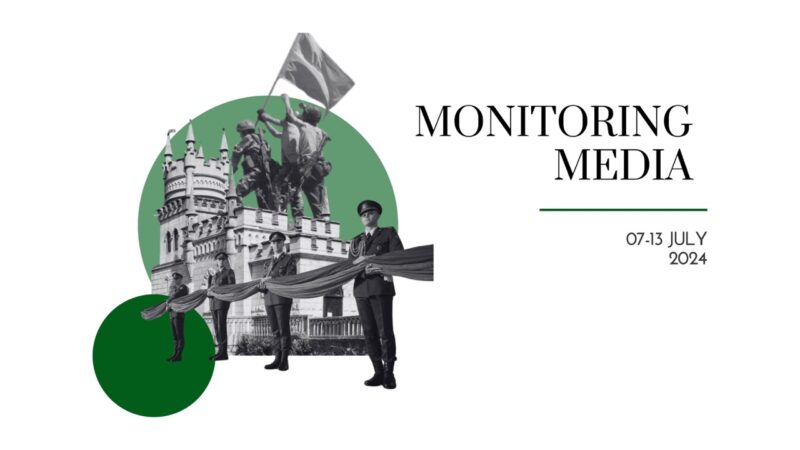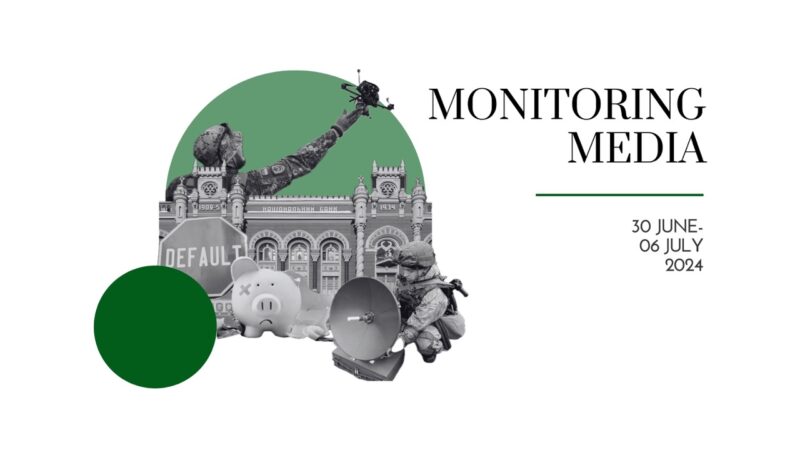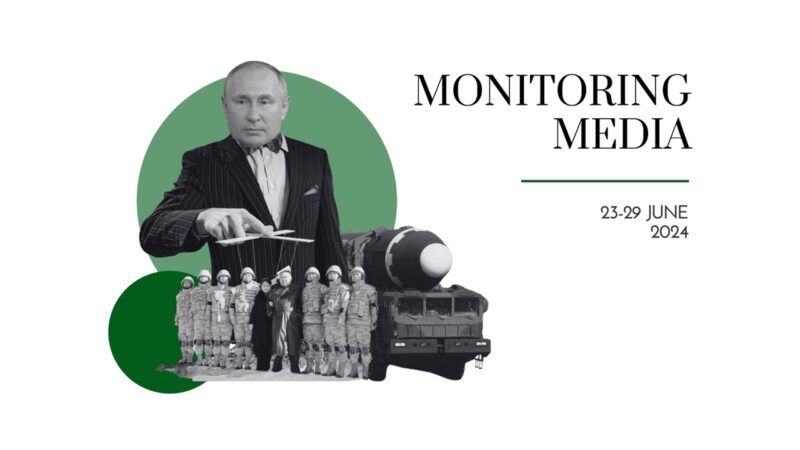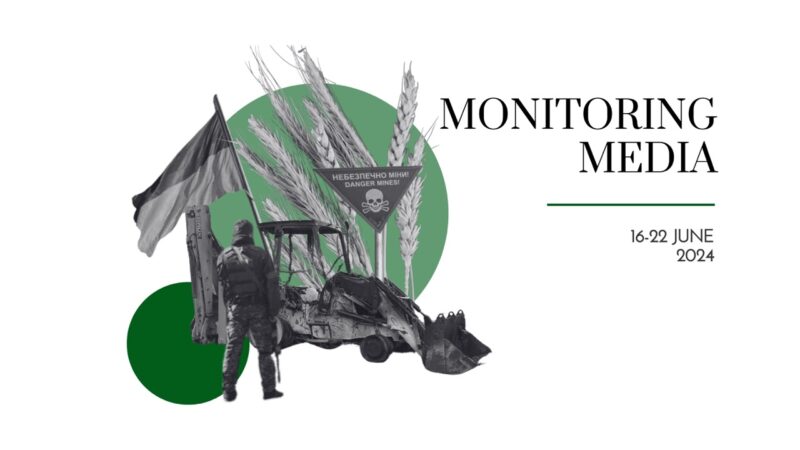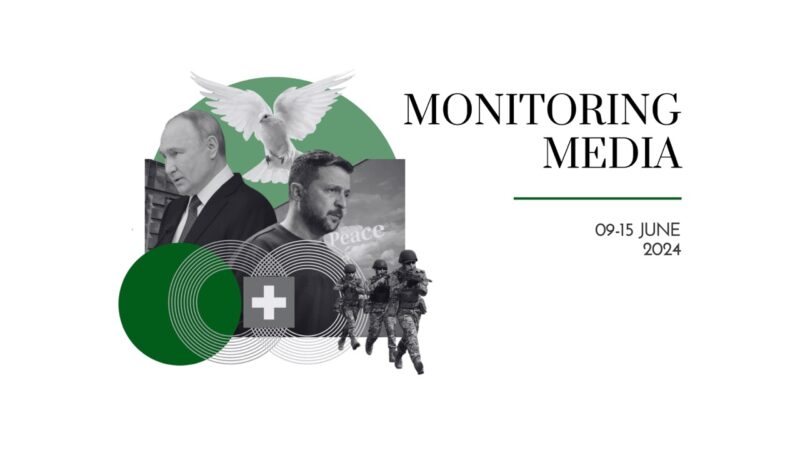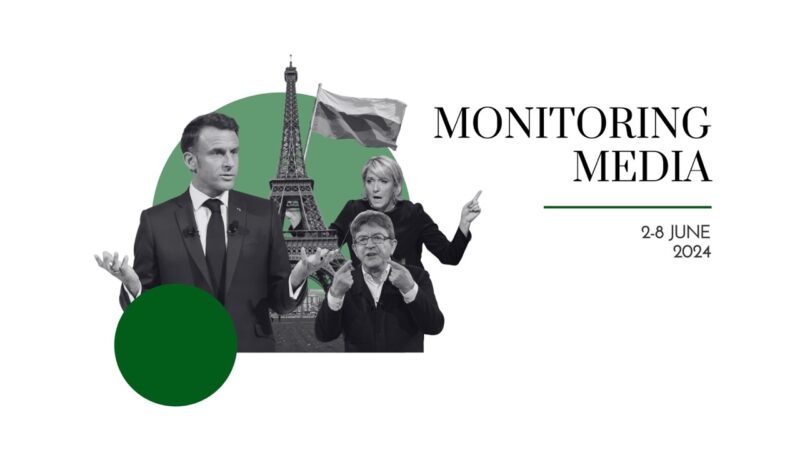Tyranny of expectations affects the course of war
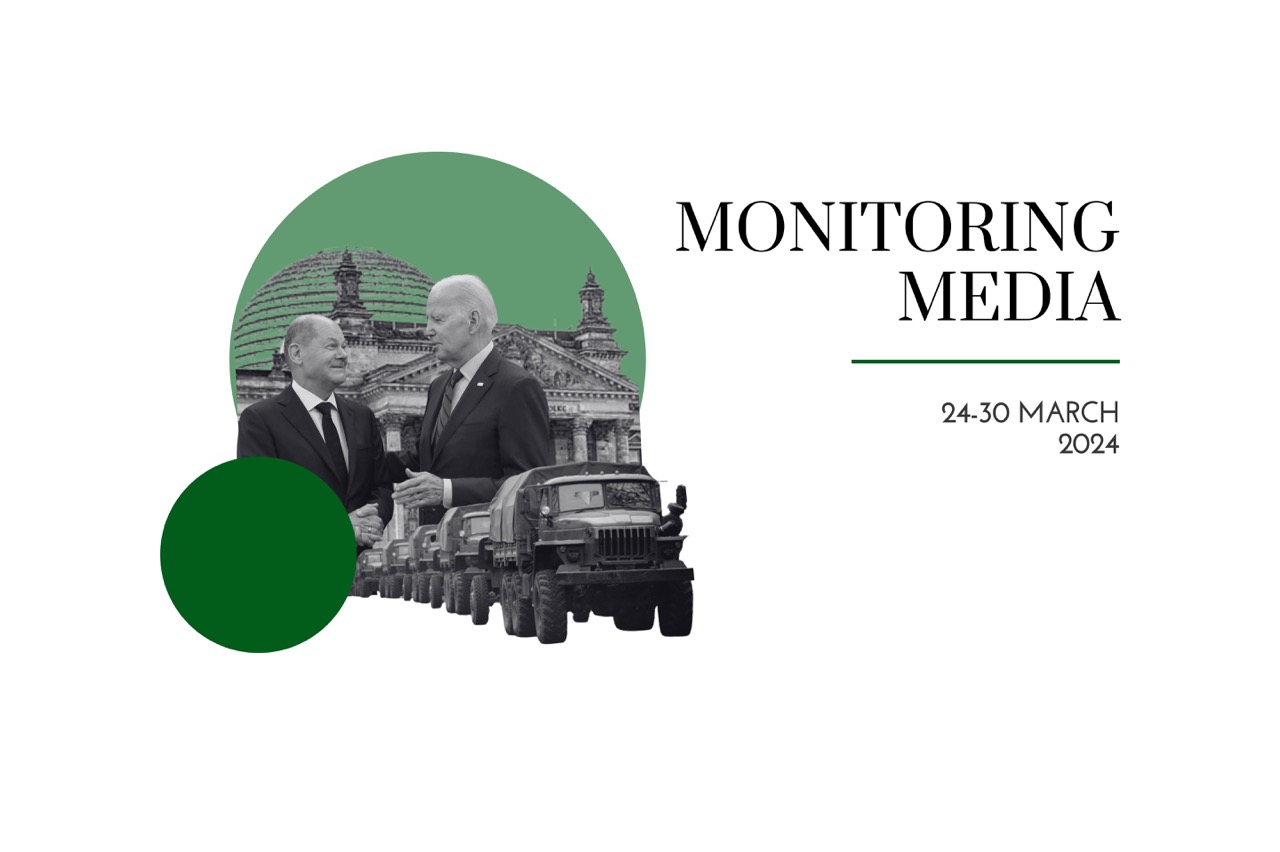
CIUS weekly report on North American media coverage of Ukrainian affairs, 24–30 March 2024
Five publications (Foreign Affairs, The National Interest, Foreign Policy, The Globe and Mail, and CBC) were selected to prepare this report on how Ukraine has been portrayed in the North American press during the past week. The sample was compiled based on their impact on public opinion as well as on their professional reputation, popularity among the readership, and topical relevance. These publications represent centrist viewpoints on the political spectrum.
This MMS report covers only the most-read and relevant articles about Ukraine, as ranked by the respective North American publications themselves in the past week. Its scope covers promoted articles on home pages and articles from special sections on Ukraine, with the hashtag #Ukraine, from the paper editions of the publications, and about Ukraine from opinion columns and editorials.
Featured topics
- The world and Ukraine: the tyranny of expectations affects the course of war; the West should capitalize on Putin’s weakness; NATO can help Ukraine today.
- Russia at war: Moscow’s terrorist attack could be a double-edged sword; Putin’s Russia goes back to a Stalinist future.
MMS summaries
The West should capitalize on Putin’s weakness. Timothy Frye, Henry Hale, Ora John Reuter, and Bryn Rosenfeld (Foreign Affairs) emphasize that Western allies should take advantage of Russian public sentiment to hasten Kyiv’s victory. While opinion polls in Russia show consistently high levels of approval for Vladimir Putin, numbers favouring the continuation of Moscow’s current aggressive course toward Ukraine are much smaller: “In fact, despite the Kremlin’s massive effort to drum up support, nearly one in four Putin backers opposes continuing the war, and roughly the same number say they are unsure whether they support the war (19 percent) or decline to answer the question (four percent). This means that only slightly more than half of Putin supporters—54 percent—think Russia should continue the war that Putin has championed since Russia’s invasion in February 2022.” Among the overall population, support for Russia’s war against Ukraine is even lower: “In October 2023, just 43 percent of Russians said they backed continuing what the Kremlin refers to as its ‘special military operation.’ … A third of those surveyed chose the response [‘No’] and nearly a quarter declined to state an opinion.” Even among supporters of continuing the war, tough measures are unpopular: “Seven of ten respondents who support the war said they were opposed to a fresh mobilization.” However, according to the authors, such sentiments do not indicate an end to the war. After all, the absence of an opposition or organized civil society allows the Moscow regime to wage it even without public approval. But this does create a window of opportunity to expedite Kyiv’s victory and end this war in Europe: “The West must supply Ukraine with the military support it needs to make Russia’s rotation of troops more urgent and the Russian costs of volunteering high. At the same time, Western nations should send Russian audiences a message that the economic and military costs of continuing the war in Ukraine outweigh the benefits.”
Moscow terror attack could be a double-edged sword for Putin. Alexander J. Motyl (National Interest) believes that a key aspect of the terrorist attack in Moscow on 22 March is not the attack itself but rather the fact that the Russian authorities had been warned in advance by the USA about such a threat. On 7 March the US Embassy in Moscow warned the Kremlin of a high probability of a terrorist attack, but on 19 March President Putin brushed it off, saying that such statements by Washington were “‘provocative,’ resembling ‘outright blackmail’ intended ‘to intimidate and destabilize our society.’” In Motyl’s analysis, it is the Russian regime’s rebuff that is significant. First, it shows that Ukraine was not behind the attack: “If the United States had any hint of Ukrainian involvement, it would have done more than issue a warning: it would have compelled the Ukrainians to desist.” Secondly, the Russian security service, the FSB, proved to be incompetent, as it failed to process Western warnings and prevent the attack. Thirdly, it is possible that Putin did not heed the warnings due to seeing conspiracies against him and his regime everywhere: “Since his word was law, this interpretation shifts the blame for the FSB’s failures squarely onto Putin’s shoulders.” Fourthly, there is a possibility that the Kremlin deliberately allowed this attack to take place: “After all, Putin and his FSB comrades know how the Reichstag fire in 1933 enabled Hitler to assume full power, just as Sergei Kirov’s assassination in 1934 served as a pretext for Stalin’s terror.” Fifth—as alleged by the intelligence bureau of Ukraine’s Ministry of Defence and by Garry Kasparov in the Wall Street Journal—the Russian regime itself may be behind these attacks: “They collaborated in 1999 to detonate bombs in several apartment buildings and killed hundreds of innocent Russians, thereby creating an ideal pretext for renewing war with Chechnya.” According to Motyl, such terrorist attacks are a double-edged sword for the Kremlin: “If used wisely, they can serve as pretexts for repression and war. If used unwisely, they can expose government indifference to human suffering and spark unrest.”
What Ukraine needs from NATO. Ivo Daalder and Karen Donfried (Foreign Affairs) opine that NATO should provide Ukraine with weapons and a clear roadmap to membership. Weapons are essential and will help Kyiv to counter the ongoing Russian aggression. In turn, Ukraine’s accession to NATO will help secure its future. That is why NATO leaders should propose a clear mechanism for Ukraine’s membership at the upcoming Washington summit marking the 75th anniversary of the alliance. However, NATO member states have differing views on this issue: “Some members, led by the Baltics, Poland, and France, want the alliance to issue a formal invitation at this July’s Washington summit. They believe that the persistence of security vacuums in Europe entices Moscow to fill those gray areas militarily—as it has in Ukraine, Georgia, and Moldova. Other members, including the United States and Germany, are not prepared to move that fast.” According to Daadler and Donfried, the Washington summit provides an opportunity to bridge this gap in views and reach a consensus on Ukraine within the alliance. To do this, the allies should take the following steps: (1) provide a clear explanation of the reforms that Ukraine must undertake to become a NATO member; (2) the alliance should coordinate military assistance provided by a coalition of more than fifty states and “help Ukraine build a modern, interoperable army”; and (3) NATO leaders should increase support for Ukraine’s defence by providing it with modern weapons, such as long-range missiles. The authors conclude, “The day Ukraine formally joins NATO will be Russia’s ultimate strategic defeat—and Ukraine and all of Europe will be the safer for it.”
Does the tyranny of expectations affect war? Dominic Tierney (Foreign Affairs) argues that Russia’s war against Ukraine and the war in the Middle East have become hostages to observers’ expectations. Regardless of their level of competence, they may compare the results of a war with their expectations rather than with objective facts: “As a result, states can lose territory and still be deemed winners if they overperform. [Or, states] can take land and be labelled losers if they underdeliver. The resulting conclusions about the winners and losers, however skewed, can even rebound and shape the battlefield.” It may seem that radiating great confidence in victory is the key to success, but this is not always the case. On the contrary, blind faith in victory can lead to a quick loss. For Ukraine, the tyranny of expectations initially worked in its favour: “After the invasion, Kyiv was the underdog, with US government officials estimating that Russia might overrun most of the country in just a few days. When Russia failed to seize the capital, Western countries were impressed by Ukraine’s performance, which encouraged them to provide more material aid. In turn, Ukraine launched a series of successful counter offensives that liberated roughly half the territory Moscow had taken.” Subsequently, inflated expectations led to the opinion in Western states that Russia’s war against Ukraine was a stalemate. However, this assessment is incorrect. Ukraine’s ability to stand up to Russia, which is several times its superior in terms of resources, is already a success. A reassessment of expectations could play to Kyiv’s advantage. This would allow Ukraine and its allies to rethink their current strategy and tactics, thus bringing victory closer. According to Tierney, “Ukraine…should make clear to policymakers and its global audience that it is a massive underdog battling a brutal dictator and perhaps the third-greatest military in the world, and yet will ultimately prevail in its fight for independence. This story might help unlock more Western aid.”
Western allies, including Canada, need to empty their stores for Ukraine. Justin Ling (Globe and Mail) highlights that the ongoing war has normalized the harrowing experience of air raids for Ukraine’s residents, who navigate their daily lives amidst the backdrop of relentless attacks from Russia. The resilience of Ukrainians is underpinned by their robust air defence systems, which have been largely supported by aid from NATO allies. Ling notes, however, that critical assistance, particularly in the form of anti-air missiles, has been stalled in Congress and tied up in bureaucratic red tape, leaving Ukraine on the brink of a severe ammunition shortage. As the situation escalates, the failure to deliver vital aid betrays the complacency of some NATO countries, including Canada, regarding the gravity of the war. While small gestures have been made, such as sending tanks and surveillance drones, the scale of aid pales in comparison to the needs on the ground. “Since the start of the war, Ottawa has committed around $4-billion in military equipment to Ukraine, putting us near the bottom of the list of Kyiv’s partners,” Ling writes. “The European Union has transferred more than $100-billion—on top of billions more in transfers from its composite members. Canada has donated less than Sweden, which has a GDP a fifth of ours and which only recently joined NATO.” The urgency of the situation demands a swift and decisive response, including raiding stockpiles for usable equipment and expediting procurement processes to provide essential resources to Ukrainian forces: “Given that this war could stretch on for years to come, with the Baltic countries possibly next in Moscow’s crosshairs, we cannot be caught with empty stockpiles again.” The author suggests that leveraging Ukrainian industry for the production of drones and anti-air technology might be beneficial not only for Kyiv but for its Western allies too, who could bolster Ukraine’s defences and foster innovation and self-reliance. Ling admonishes that bureaucratic hurdles and stringent export controls must be addressed to streamline aid efforts: “Will we do whatever it takes to defend Ukraine?”
Odesa battles devastation, despair amidst Russian attacks. Michael Bociurkiw (Globe and Mail) reflects on Ukraine’s port city of Odesa, once known for its vibrant atmosphere and pivotal role in global trade, now lying wounded and darkened after relentless Russian attacks have crippled the city’s infrastructure. Russia’s most recent assault on Odesa’s energy systems has left millions without power, exacerbating the city’s struggles and prompting a slow but steady exodus of its young talent to safer havens in Western Europe. As the barrage of Russian drones and rockets intensifies, Odesa faces not only physical destruction but also the erosion of its social fabric and economic stability, Bociurkiw adds. Moreover, the psychological toll of constant bombardment is evident, with residents increasingly worn down by the relentless attacks and the pervasive fear they instil. Amid the darkness, the author notes, there are glimmers of hope as Ukrainian forces continue to defy expectations, inflicting significant damage on the Russian navy and enabling the return of international vessels to Odesa’s port. However, the spectre of violence looms large: “While it’s impossible to get into the twisted mind of Mr. Putin, there’s general agreement here that his forces won’t try to occupy Odesa but rather will pummel it with further waves of damaging strikes.”
Thousands of lost tanks in Ukraine accepted as cost by Russia. Geoff Nixon (CBC) writes that as Ukraine defends against Russia’s aggression, its military leaders have defiantly declared their readiness to meet the enemy with advanced weaponry. The extensive use of Western-supplied anti-tank weapons and drones has proven effective against Russian tanks, resulting in significant losses for the invading forces. Following these setbacks, Russia is now sending older tanks, dating back to the Cold War era, to the front lines, underscoring President Putin’s prioritization of territorial ambitions over the well-being of his troops. The war in Ukraine has highlighted the limitations of outdated tank models and the challenges posed by modern warfare tactics, particularly the rise of drone technology. Analysts speculate on the dubious adaptability of tanks against these emerging threats and ponder the potential transformation of traditional combat strategies. In Russia, criticism of the staggering losses of tanks in Ukraine is muted due to President Putin’s authoritarian grip on dissent, allowing him to pursue his war plans without significant opposition. According to Nixon, Russian troop losses and the depletion of tank resources are accepted as part of the relentless pursuit of the Kremlin’s geopolitical objectives.
Putin’s Russia reverting to Stalinist repression, totalitarian rule. Adrian Karatnycky (Foreign Policy) argues that in echoing the totalitarian practices of the Soviet era, Russia under Vladimir Putin has reverted to a system of repression and control reminiscent of Stalinist rule. The recent national election, characterized by improbable results and the absence of a viable political opposition, serve as a symbolic return to Soviet-style tactics aimed at solidifying support for the regime. This transformation has culminated in Putin’s fifth term in office, effectively sealing the transition of post-Communist Russia into a repressive society embracing the legacy of its totalitarian past. Besides sham elections, Russia’s descent into authoritarianism extends to pervasive political repression, surpassing even the Soviet Union in its crackdown on dissent. The Putin regime has weaponized the legal system in order to stifle opposition, with thousands facing criminal charges for political dissent and administrative punishments for participating in unsanctioned activities. Recent legislative amendments have further empowered the state to prosecute individuals for vaguely defined offences, effectively curtailing freedom of expression and perpetuating a culture of fear and intimidation. The erosion of civil liberties and the normalization of state-sponsored violence mirror the darkest chapters of Russia’s Soviet history, with Putin’s regime emulating Stalin’s tactics of control and propaganda. Through the suppression of independent media, persecution of dissidents, and glorification of authoritarian leadership, Putin has crafted a personality cult reminiscent of the Soviet dictator. As Russia’s trajectory veers toward neo-Stalinism and imperialist expansion, the implications extend beyond its borders, posing a significant threat to global security and necessitating a unified response from the international community. Karatnycky concludes, “Meeting the modern-day Russian threat will require as much consistency and as deep a commitment as when the West faced down Stalin’s Soviet Union at the height of the Cold War.”
